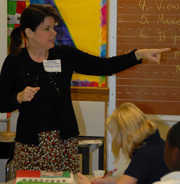
The University of Notre Dame extended Research Community (NDeRC) will host the fourth annual Collaborating for Education and Research Forum on Saturday (Jan. 22) from 8:30 a.m. to 2 p.m. in the Jordan Hall of Science.
The forum brings together K-12 teachers and administrators, university faculty, graduate students and staff to consider ways to collaborate in building a vibrant Science, Technology, Engineering and Mathematics (STEM) community. Through parallel breakout sessions, the forum will acquaint area K-12 teachers and administrators with the educational outreach and research opportunities available with Notre Dame faculty.
Congressman Joe Donnelly will speak at the family and neighborhood plenary session at 11:30 a.m. During that session, presenters will be highlighting programs to promote parental involvement in student’s education. Some 150 teachers, school administrators and University researchers are expected to attend.
NDeRC's integrated STEM community model focuses on increasing the number and kinds of interactions among engineers and scientists from industry, university and the community; graduate and undergraduate students from across the STEM disciplines; K-12 teachers and students. NDeRC collaborates with several other National Science Foundation-supported programs to foster a broad spectrum of opportunities for K-12 teachers and students, including Research Experiences for Teachers, BioEYES, and numerous other programs.
BioEYES offers a weeklong activity using zebrafish as a model to teach local students the fundamentals of embryonic development and genetics in their own classrooms. During the past academic year alone, the BioEYES program reached out to 35 schools in the Michiana area, involving 50 K-12 teachers in 130 classrooms and serving 3,600 students. These weeklong classroom activities at primary, middle and high schools in the local area will reach 10,000 students by the end of this academic year. The BioEYES program at Notre Dame was co-designed, piloted and led by NDeRC graduate students since its inception. Because of the success of BioEYES, NDeRC has promoted the program as a model for a suite of similar programs with activities in environmental science, nanotechnology, and earth/space science for primary, middle and high school classrooms. Cloning a fluorescent gene (in partnership with Genotyp, Inc.) and particle physics activities are also available for high school classrooms.
A complete schedule is available at: http://events.michianastem.org/Forum4/.